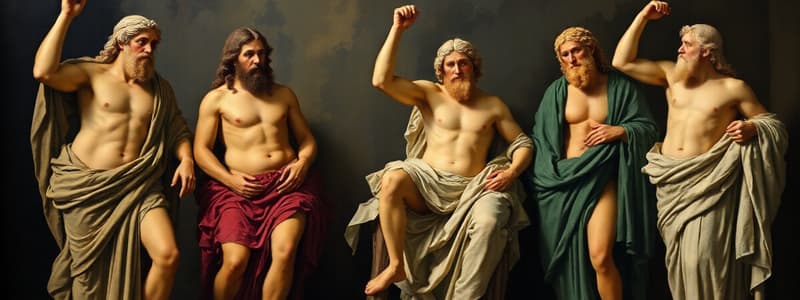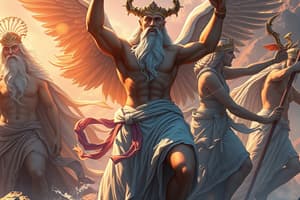Podcast
Questions and Answers
Which Olympian god is known as the king of the gods and is associated with justice and thunder?
Which Olympian god is known as the king of the gods and is associated with justice and thunder?
- Ares
- Hades
- Zeus (correct)
- Poseidon
Which goddess is associated with agriculture, fertility, and mourning for her daughter?
Which goddess is associated with agriculture, fertility, and mourning for her daughter?
- Demeter (correct)
- Athena
- Hera
- Artemis
What is the primary responsibility of Hades, one of the Olympian gods?
What is the primary responsibility of Hades, one of the Olympian gods?
- The Underworld (correct)
- Wisdom
- Love
- War
Which god is known for his role in metalworking and craftsmanship?
Which god is known for his role in metalworking and craftsmanship?
Which Olympian goddess is known for her fierce independence and role in marriage and childbirth?
Which Olympian goddess is known for her fierce independence and role in marriage and childbirth?
What is the primary area of influence for Athena among the Olympian gods?
What is the primary area of influence for Athena among the Olympian gods?
Which god is often depicted with a caduceus and known as the messenger of the gods?
Which god is often depicted with a caduceus and known as the messenger of the gods?
Which Olympian deity is associated with the moon and hunting?
Which Olympian deity is associated with the moon and hunting?
What is the meaning of the term 'do ut des' in the context of Greek worship?
What is the meaning of the term 'do ut des' in the context of Greek worship?
Which method was NOT used by Greeks to honor their gods?
Which method was NOT used by Greeks to honor their gods?
For what purpose did Demeter receive requests from mortals?
For what purpose did Demeter receive requests from mortals?
What type of literature is Hesiod’s 'Works and Days' categorized as?
What type of literature is Hesiod’s 'Works and Days' categorized as?
What characteristic is uniquely associated with Athena in her depiction on the Panathenaic amphora?
What characteristic is uniquely associated with Athena in her depiction on the Panathenaic amphora?
Which of the following is a purpose of using epithets for Greek gods?
Which of the following is a purpose of using epithets for Greek gods?
What is one of the main themes in Hesiod's 'Theogony'?
What is one of the main themes in Hesiod's 'Theogony'?
How do anthropomorphic depictions of gods manifest in Greek art?
How do anthropomorphic depictions of gods manifest in Greek art?
In which of the following examples do gods provide comic relief?
In which of the following examples do gods provide comic relief?
Which goddess punished Hippolytus for rejecting her in favor of Artemis?
Which goddess punished Hippolytus for rejecting her in favor of Artemis?
What does the term 'aetiology' refer to in Greek literature?
What does the term 'aetiology' refer to in Greek literature?
Which of the following best represents a local god in Greek worship?
Which of the following best represents a local god in Greek worship?
What notable effect does zoomorphism have in representations of gods?
What notable effect does zoomorphism have in representations of gods?
Match the following Olympian gods with their domains:
Match the following Olympian gods with their domains:
Flashcards
Polytheism
Polytheism
The belief in multiple gods.
Olympians
Olympians
The twelve major deities in Greek mythology who lived on Mount Olympus.
Who is Zeus?
Who is Zeus?
The king of the gods, associated with the skies, justice, fate, men, hospitality, and thunder.
Who is Poseidon?
Who is Poseidon?
Signup and view all the flashcards
Who is Hades?
Who is Hades?
Signup and view all the flashcards
Who is Hera?
Who is Hera?
Signup and view all the flashcards
Who is Athena?
Who is Athena?
Signup and view all the flashcards
Who is Demeter?
Who is Demeter?
Signup and view all the flashcards
Reciprocal Relationships Between Gods and Mortals
Reciprocal Relationships Between Gods and Mortals
Signup and view all the flashcards
Do ut des
Do ut des
Signup and view all the flashcards
Temples and Altars
Temples and Altars
Signup and view all the flashcards
Sacrifices
Sacrifices
Signup and view all the flashcards
Prayers
Prayers
Signup and view all the flashcards
Festivals
Festivals
Signup and view all the flashcards
Votive Offerings
Votive Offerings
Signup and view all the flashcards
Libations
Libations
Signup and view all the flashcards
Aetiology
Aetiology
Signup and view all the flashcards
Theogony
Theogony
Signup and view all the flashcards
Anthropomorphism
Anthropomorphism
Signup and view all the flashcards
Zoomorphism
Zoomorphism
Signup and view all the flashcards
Epithets
Epithets
Signup and view all the flashcards
Heroes
Heroes
Signup and view all the flashcards
Hero Cults
Hero Cults
Signup and view all the flashcards
Study Notes
Nature of the Olympian Gods
- Greek religion was polytheistic, believing in multiple gods.
- The twelve major deities were called the Olympians.
- They were believed to reside on Mount Olympus.
Major Gods and Their Roles
- Zeus: King of the gods, sky, justice, fate, men, hospitality (xenia), thunder. Depicted as a bearded man, often with lightning bolts, an eagle, or on a throne. Had affairs and was married to Hera.
- Poseidon: God of the sea, earthquakes, rivers, storms, and horses. Represented by a trident, and often with horses. Brother of Zeus, important to sailors.
- Hades: God of the Underworld. Depicted as an older, bearded man with symbols like Cerberus (three-headed dog), the Underworld, and Persephone. Rarely left the Underworld.
- Hera: Goddess of marriage, women, childbirth, and family. Often depicted with a diadem, sometimes with children. Wife of Zeus, known for strength and independence.
- Athena: Goddess of war, wisdom, tactics, intelligence. Symbolized by an owl, helmet, spear, aegis (shield with gorgon head), and Nike (victory). Patron of Athens, and associated with the moon. Born fully grown in armor.
- Demeter: Goddess of agriculture, harvest, fertility, and childbirth. Associated with diadem, wheat, or flowers. Mother of Persephone, her mourning caused famine.
- Hestia: Goddess of the hearth, home, and state security. Depicted as veiled. Sacrifices started at her flame.
- Hephaestus: God of metalworking, fire, craftsmen, and blacksmiths. Represented by a hammer, tongs, anvil. Thrown off Olympus by Zeus and connected to fire and crafting.
- Aphrodite: Goddess of love and beauty. Often depicted rising from a seashell, with doves, swans, and Eros (cupid). Involved in the Golden Apple myth and had affairs.
- Artemis: Goddess of hunting, wildlife, the moon, childbirth, and maidens. Associated with a bow, arrows, dogs, the moon, and deer. Twin of Apollo.
- Apollo: God of music, arts, education, archery, and the sun. Symbolized by a bow, arrows, lyre, laurel, and a youthful appearance. God of prophecies and the arts, with Delphi as his oracle.
- Hermes: God of travel, trade, and the messenger of the gods. Associated with a caduceus, winged sandals, and a traveler's cloak.
- Ares: God of war (brutality). Depicted in armor. Known as a relentless killer in Homer's Iliad.
- Dionysus: God of wine, theatre, ritual madness, and revelry. Associated with a thyrsus, vines, animal skins, and wild animals. Associated with celebration, such as the City Dionysia.
- Three Virgin Goddesses: Athena, Artemis, and Hestia.
- Dionysus and Hestia: Interchangeable as Olympian figures.
Reciprocal Relationships Between Gods and Mortals
- "Do ut des": Mortals honored the gods through reciprocity.
- Greeks honored gods through temples, altars, sacrifices, prayers, festivals, votive offerings, and libations.
- Mortals requested specific favors from gods (e.g., Demeter for a good harvest, Hera for support in childbirth).
- Disrespecting or neglecting the gods could lead to punishments. (e.g., The Bacchae, Hippolytus).
The Significance of Homer and Hesiod
- Homeric Hymns: Stories of god's births and origins. Written around 700BC, stylistically similar to Homer's epics but not Homer's work. Explains Theogony (origin) and Aetiology (reason for worship).
- Hesiod's Works and Days: Wisdom literature from around 700 BC. Focused on moral instruction and human existence.
Prescribed Source - Panathenaic Amphora Showing Athena
- Date: 333-332 BC
- Style: Black Figure
- Reverse: Three athletes running
- Details about Athena: Shown proactively involved in mortal affairs, a punisher, and protector. Visualized as powerful, modest, and a warrior goddess. Connected to Amazons.
Hesiod and Homer
- Hesiod's Works and Days: Instruction on agriculture, moral conduct, avoiding Eris (strife). Emphasizes Zeus' justice and religious purity (like washing hands). Intended for brother Perses, providing guidance.
- Hesiod's Theogony: Focuses on the origin of the gods and how they relate to mortals. Explains why gods deserve worship.
Gods in Homer's Works
- Gods are powerful but prone to personal desires.
- They often favor specific mortals in epics like the Odyssey and Iliad.
- They offer comedic relief.
- Gods interact directly or morally with mortals.
Anthropomorphism and Zoomorphism
- Anthropomorphism: Gods exhibit human-like emotions (jealousy, love, hate, revenge). They look like humans but have special signs. Examples include Zeus, Hades, and Pan.
- Zoomorphism: Gods take animal forms (Zeus as an eagle, Artemis as a deer or swan). Animals symbolize attributes. Examples include Athena's owl, Hera's doe-eyes, and Zeus turning into a swan.
Epithets
- Epithets describe specific qualities or roles of gods. They highlight local or larger area worship and reflect how the gods were honored.
- Examples: Zeus (Xenios, Herkeios, Olympios). Athena (Parthenos, Nike, Areia). Demeter (Chthonia).
Hero Cults
- Heroes are real or mythological individuals who bridge the mortal and divine worlds
- Examples include Heracles and Asclepius
- Practices include sacrificial rites and grave worship.
- Evidence includes literature (e.g., Homeric Epics) and archaeology (calendars and monuments).
Panhellenic, Localised, or Personal Worship
- Gods were worshipped locally and on a larger scale
- Examples include Zeus, Athena, Heracles
- Worship styles differed depending on region and individual need
Key Terms
- Aetiology: Cause or reason
- Agora: Marketplace
- Anthropomorphic: Human characteristics applied to non-humans
- Epithet: Special term/phrase
- Theogony: Genealogy of gods
- Zoomorphism: Animal characteristics applied to humans
Studying That Suits You
Use AI to generate personalized quizzes and flashcards to suit your learning preferences.
Description
Explore the fascinating realm of the Olympian gods in Greek mythology. This quiz covers their nature, major deities, and individual roles within the pantheon, focusing on their significance in Greek religion and culture. Test your knowledge on their attributes and relationships!




